Contents
Peonies-like flowers are a good substitute for beginners in floriculture. The fact is that they are quite demanding in care and maintenance. But there are a number of plants that look very similar to peonies, while being unpretentious. All of them have densely double flowers of an unusual shape with a delicate aroma, for which they are popular.
What flowers look like peonies
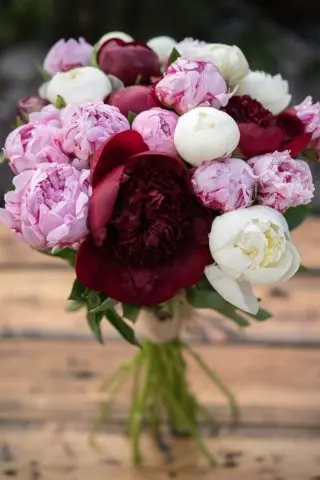
Peony is a popular perennial crop, suitable for cutting.
Peony is a perennial shrub. It has beautiful decorative leaf plates, a long root, flowers reach 25 cm in diameter. About 5000 varieties of herbaceous peonies and more than 500 tree peonies are officially registered.
Varieties have differences in flowering time, bush size, structure, flower shade, bud size. Popular colors are pink, crimson, white, yellow and orange. The peony has very good compatibility with many cultures, due to which it is actively used in landscape design. However, there are many names of flowers similar to peonies.
Ranunculus
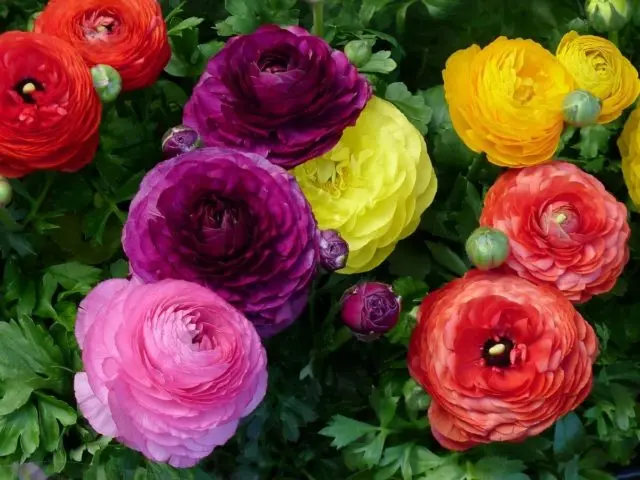
Ranunculus is called the flower of brides
This peony-like flower is called ranunculus. It looks quite impressive, so it is often used to decorate loggias, balconies, gazebos and terraces. The height of the bush sometimes reaches 80 cm. The shoot is strong, the leaf plate is dissected, the root system is in the form of tubers.
Flower growers grow different varieties and hybrids of ranunculus. To achieve beautiful flowering, you must follow some rules. Experts warn that the roots of the plant are very sensitive and can be burned with some fertilizers. It is better to use those that contain biohumus. The culture reacts painfully to the transplant, so the place for it must be determined immediately. For the full flowering of the ranunculus, it must be provided with limestone and potassium. For a longer budding period, experienced flower growers remove the plant pot to a dark place and reduce watering. It is also necessary to timely prune after the flowering period.
How peonies and ranunculus are similar, how they differ
The flower is very similar to a peony. It can also be thick-double, terry and semi-double. The color is very diverse, like a peony. Flowers of purple, blue shades are not found. The diameter of the ranunculus is much smaller – 5-10 cm. The buds open gradually, from May to August. The leaf plate differs sharply from the green mass of the peony.
Pion-shaped roses
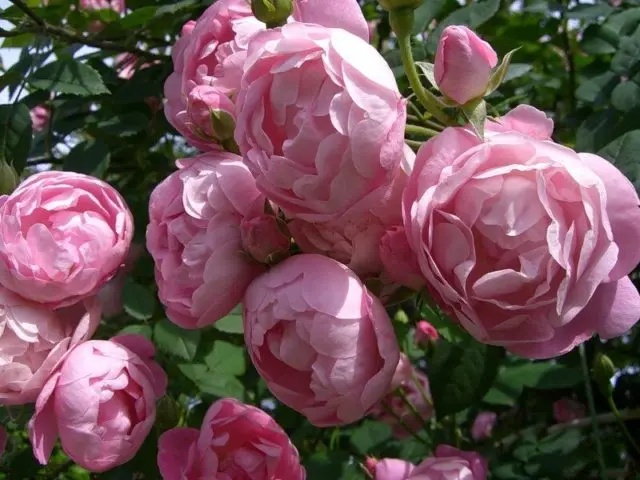
The English rose is widely used in landscape design.
Another flowers that are very similar to peonies are called peony or English roses (pictured). The culture was created in England by David Austin. Once a famous breeder was fascinated by old varieties of roses at one of the exhibitions and took part in the formation of new colors, instilled in them resistance to diseases and pests.
Peony roses are a versatile plant. It is used to create flower beds, hedges, as a decoration for swings, arbors and entrance groups. These roses can be grown both outdoors and in pots.
How peonies and peony roses are similar, their differences
Many say that the English rose flower looks more like a peony. Its diameter is more than 15 cm, the bud is round, rather lush. Differs in variety of shades and aroma. Significant differences are also on the part of the leaves – in a rose they are much smaller.
Terry carnation
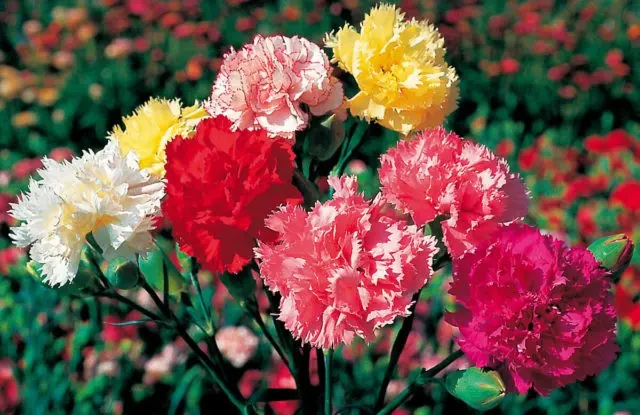
Carnation variety Shabo is most similar to peony
Carnation is a perennial plant with a huge number of varieties and hybrids. Some of them are very similar to peonies. For example, terry. The flowers of this culture can be single or grouped on one shoot in several pieces. The petals are densely arranged, have a velvety appearance with a slight fringe. The color of the flowers is varied. Some types of cloves have medicinal properties.
Carnation propagates by layering and seeds. It is recommended to plant it in sunny, well-lit areas. For planting in open ground, special soil with peat, river sand and turf will be required. Carnation does not perform well if it grows for more than 5 years in one place. She needs a quick transplant. It tolerates winter well without shelter.
What is similar to a peony and what are the differences
The peony varieties include the Shabo hybrid. Its flowers are small but peony-like. The leaf plates are completely different, in carnations they are narrow and straight, the flowering period is much longer. The shade of the flower can be monophonic or consist of several colors. The hybrid smells very pleasant, especially in the evenings.
peony poppy
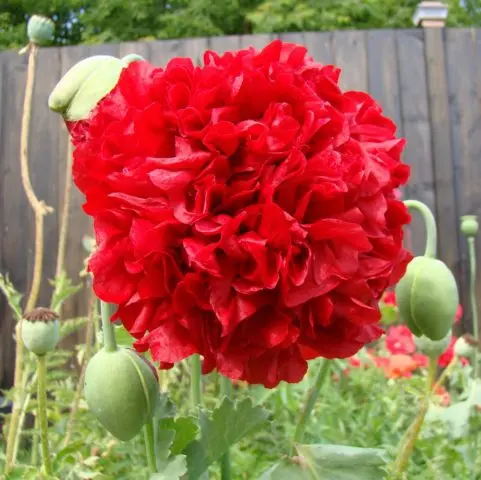
Peony poppy or papaver can propagate by self-sowing
Culture has another name – papaver. The plant is an annual and was bred to look like a peony. Flower growers plant it on the sunny side of the site in early spring, trying to make a deep hole, since the root system of the plant is pivotal. Propagated by cuttings or seeds. Watering prefers moderate, requires top dressing for leaves and lush flowering. Peony poppy is used for mixborders, lawns and cutting.
Similarities and differences from peony
It differs in that it refers to annuals. It has a strong root system. Terry inflorescences are large, but the plant is not rich in color – pink shades predominate. Flowering time is about a month. Another difference is the ripening of the fruit-box with small black seeds.
double tulips
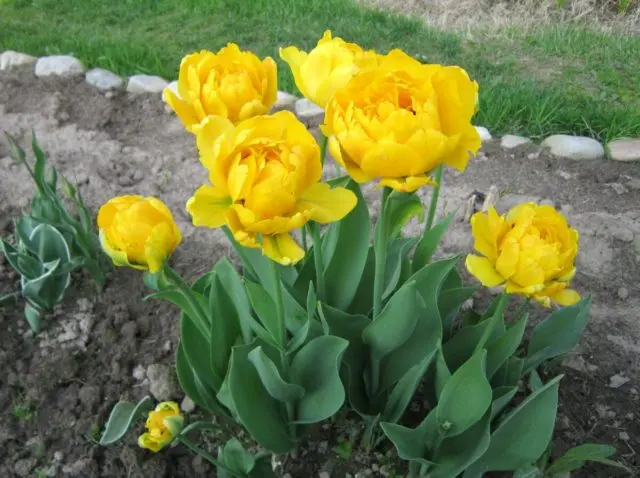
Flowers of some varieties of tulips are valued for a terry basket
Tulips are bulbous plants, perennials. They are not demanding in care and maintenance, for which they are popular with flower growers. Some terry hybrid varieties are very similar to peonies. A feature in the structure of the bud, which has the shape of a wide cup. Such varieties are the result of many years of breeding work. Compared to parental specimens, they are more sensitive to environmental influences and diseases.
How peonies and densely double tulips are similar, how they differ
The similarity lies only in the shape of the flower. As for the difference, the cultures differ in the duration of flowering, propagation methods, conditions of detention and shades.
Pompom varieties of chrysanthemums
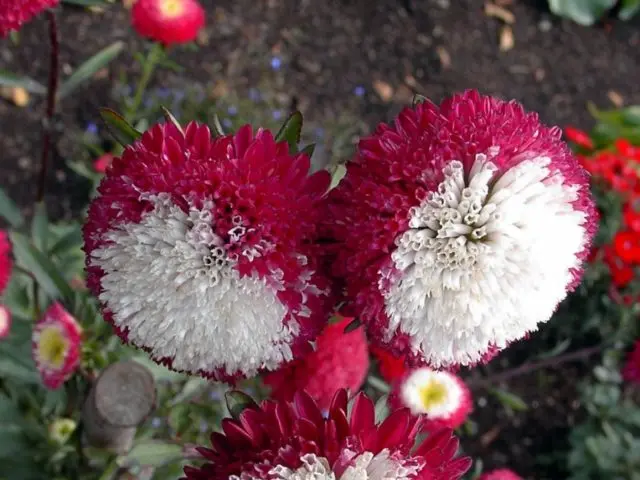
Chrysanthemum is the most popular culture among gardeners, which looks like a peony.
Chrysanthemum comes from Asia and reached Europe in the XNUMXth century. This culture has a thousand-year history. Among the flowers there are perennial and annual varieties. Most varieties and hybrids can be grown outdoors in temperate climates, but there are varieties that require greenhouse conditions. The most valuable specimen for gardeners is the large-flowered and small-flowered perennial chrysanthemum.
In Chinese medicine, chrysanthemum flowers are used as a remedy for migraines, diseases of the digestive system. In some Asian countries, the stems and leaves are added to food as a condiment.
Similarities and differences with peony
The resemblance to a peony flower is highly doubtful. However, some varieties really resemble it. This applies to a number of hybrid varieties, the petals of which are collected in many rows, forming a terry basket. Chrysanthemum has a variety of shapes and shades, completely unpretentious in care.
Eustoma
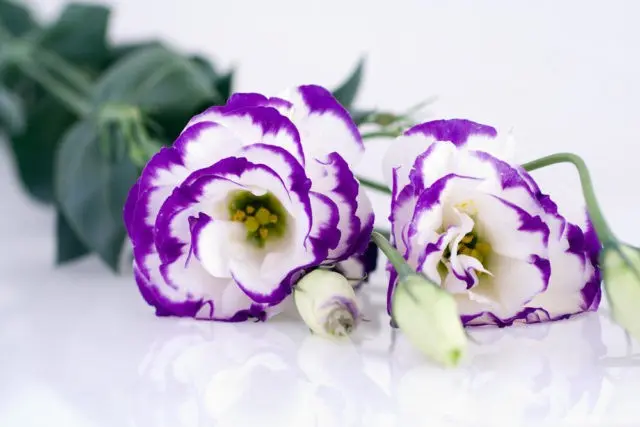
Eustoma has many varieties and hybrids, has an unusual color
Another flower that looks like a peony is called eustoma. He is a real decoration of the garden. It has delicate shades of flowers with a diameter of up to 7 cm. It has become a domestic plant quite recently, thanks to the efforts of Japanese breeders. Now eustoma is more resistant to diseases and pests, undemanding to care. It is noteworthy that the stems of the plant are tall, branching towards the end, which is why they resemble a bouquet.
For good flowering, she will need a lot of diffused light, fresh air, watering, but without stagnant moisture. Also, for proper development, the plant will need top dressing and timely pruning after flowering.
Similarities and differences from peonies
The flowers, which have not yet fully blossomed, are very similar to peonies. Similarity is observed in the structure of the bud and a high, strong stem, and the shades of eustoma are much more diverse. Peony are more reminiscent of terry varieties and hybrids.
Conclusion
Flowers similar to peonies are very diverse in color, care methods and content. Some can be grown outdoors and in a pot. Many of them are completely unpretentious, and the rest need to adapt. But they are all beautiful and worthy of attention.









